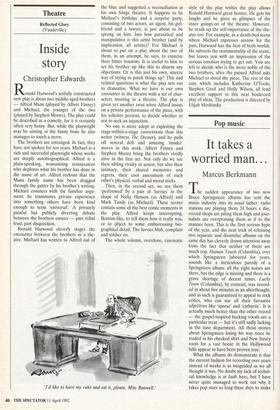Theatre
Reflected Glory (Vaudeville)
Inside story
Christopher Edwards
Ronald Harwood's artfully constructed new play is about two middle-aged brothers — Alfred Manx (played by Albert Finney) and Michael, the younger of the two (played by Stephen Moore). The play could be described as a comedy, for it is certainly often very funny. But, while the playwright may be aiming at the funny bone he also manages to touch a nerve.
The brothers are estranged. In fact, they have not spoken for ten years. Michael is a rich and successful playwright whose works are deeply autobiographical. Alfred is a plain-speaking, womanising restaurateur who deplores what his brother has done in the name of art. Alfred reckons that the Manx family name has been dragged through the gutter by his brother's writing. Michael counters with the familiar argu- ment: he transmutes private experience into something others have been kind enough to term 'universal'. A privately painful but publicly diverting debate between the brothers ensues — part tribal feud, part disquisition.
Ronald Harwood cleverly stages the encounter between the brothers in a the- atre. Michael has written to Alfred out of the blue and suggested a reconciliation at his own fringe theatre. It happens to be Michael's birthday and a surprise party, consisting of two actors, an agent, his girl- friend and a lawyer, is just about to be sprung on him. Just how parasitical and manipulative is this artist brother (and by implication, all artists)? For Michael is about to put on a play about the two of them, in an attempt, he says, to exorcise their bitter tensions. It is useful to him to set his brother up like this to disarm any objections. Or is this just his own, sincere way of trying to patch things up? This and related questions is what the play sets out to dramatise. What we have is our own encounter in the theatre with a set of char- acters meeting in a theatre. The play is given yet another twist when Alfred insists on a private performance of the piece, with his solicitor present, to decide whether or not to seek an injunction.
No one is more adept at exploiting the stage-within-a-stage conventions than this writer (witness The Dresser), and he pulls off several deft and amusing `insider' moves in this work. Albert Finney and Stephen Moore bring the brothers vividly alive in the first act. Not only do we see their sibling rivalry in action, but also their intimacy, their shared memories and regrets, their cool assessment of each other's physical, verbal and moral tricks.
Then, in the second act, we see them 'performed' by a pair of quwies' in the shape of Nicky Henson (as Alfred) and Mark Tandy (as Michael). These scenes contain some of the best comic moments in the play. Alfred keeps interrupting, Bottom-like, to tell them how it really was, or to object to some embarrassing bio- graphicd1 detail. The luwies blub, complain and soldier on.
The whole solemn, overdone, cinematic 'I'd like to have my cake and eat it, please, Miss Banwell.' style of the play within the play allows Ronald Harwood great licence. He gets his laughs and he gives us glimpses of the inner goings-on of the theatre. However, he sends up the self-importance of the the- atre too. For example, in a death-bed scene where Michael expresses sorrow for the past, Harwood has the best of both worlds. He subverts the sentimentality of the scene, but leaves you with an impression of the serious emotion trying to get out. You are left to decide who is the more noble of the two brothers, after the pained Alfred asks Michael to shred the piece. The rest of the cast, which includes Katherine O'Toole, Stephen Greif and Holly Wilson, all lend excellent support to this neat boulevard play of ideas. The production is directed by Elijah Moshinsky.


















































 Previous page
Previous page